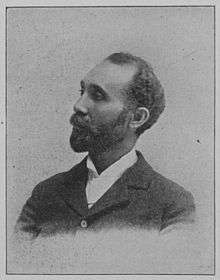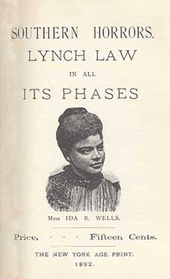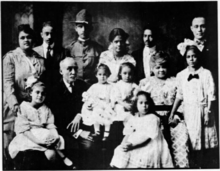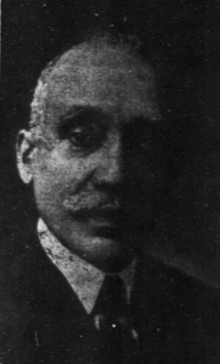Ferdinand Lee Barnett (Chicago)
| Ferdinand Lee Barnett | |
|---|---|
 Photo of Barnett from 1900 | |
| Born |
1859 Nashville, Tennessee |
| Died |
March 11, 1936 (aged 76–77) Chicago, Illinois |
| Alma mater | Union College of Law |
| Occupation | Journalist, lawyer |
| Political party | Republican, later Democratic |
Ferdinand Lee Barnett (1859 – March 11, 1936) was an American journalist, lawyer, and civil rights activist in Chicago, Illinois. In 1895 he married anti-lynching activist Ida B. Wells. He was a founding editor of the Chicago Conservator in 1878. He was a successful lawyer and was the third black person to be admitted to the Illinois bar. In 1896 he became Illinois' first black assistant state's attorney. He was active in anti-lynching and civil rights and was called "one of the foremost citizens Chicago has ever had" by the Chicago Defender.[1]
Early life
Ferdinand Lee Barnett was born in Nashville, Tennessee in 1859.[1] His mother was freewoman[2] Martha Brooks and was born about 1825. His father, also named Ferdinand Lee Barnett, was born in Nashville in about 1810 and worked as a blacksmith. He purchased his family's freedom the year Ferdinand was born. They lived in Nashville until about 1859 when they moved to Windsor, Ontario.[3] Ferdinand's mother died November 11, 1908[4] and his father died in early February 1898.[5]
The Barnett family moved to Chicago in 1869 and Ferdinand was educated in Chicago schools,[1] first attending the old Jones school at Clark and Harrison. He then entered Central High School,[2] graduating in 1874. After high school he taught in the southern United States for two years before returning to Chicago to attend Union College of Law, later a part of Northwestern Law School. Barnett graduated from law school and was admitted to the Illinois bar in 1878.[1] He was the third black person to pass the Illinois bar, following Lloyd G. Wheeler and Richard A. Dawson.[6]
Barnett was a cousin to another Ferdinand L. Barnett and his brother Alfred S. Barnett who were also journalists and lived in Omaha and Des Moines.[7]
Conservator and early activism
In December 1877, Barnett along with co-editors Abram T. Hall, Jr. and James E. Henderson organized the semi-monthly newspaper, the Conservator, the first edition appearing on January 1, 1878.[8] The Conservator was a radical journal which focused on justice and equal rights, and Barnett was soon recognized as a local black leader. Barnett was a delegate to the May 1879 National Conference of Colored Men in Nashville and gave a noted speech calling for unity and education.[1] He was a delegate to the 1884 Inter-State Conference of Colored Men in Pittsburgh,[9] and the national convention of the Timothy Thomas Fortune led Afro-American League in Chicago in 1890 where he was named secretary.[10]
Legal and political career
Barnett started practicing law around 1883.[1] His prominence grew quickly and in 1888 he was considered for a Republican nomination for Cook County Commissioner.[11] In 1892 he started a law partnership with S. Laing Williams. The pair split over Williams' affiliation with Booker T. Washington, whom Barnett frequently opposed.[1]
Ida B. Wells

In 1892, three men, including a friend of Ida B. Wells, were lynched by a white mob while in police custody in Memphis, Tennessee, in an event known as the Peoples Grocery lynching. The act sparked a national outcry and Barnett took part in meetings in Chicago called to organize reaction. At a meeting of one thousand people at Bethel A. M. E. Church, Reverend W. Gaines' call for the crowd to sing the then de facto national anthem, "My Country, 'Tis of Thee", but the call was refused, one member of the audience declaring, "I don't want to sing that song until this country is what it claims to be, 'sweet land of liberty'".[12] Gaines substituted the Civil War-era song about the abolitionist martyr, "John Brown's Body". Barnett closed the meeting appealing for calm and a careful response, but also expressing great frustration and concern that the violence against blacks may one day lead to reprisals.[12]
The event inspired Wells, who began to research and speak out against lynchings. In 1893, Wells sued the Memphis Commercial for libel when the journal attacked Wells over her reports on the racism and injustice of lynching. It had been claimed that lynching, while not legal, was a natural result of the need for revenge of a community against perpetrators of violent crime and did not single out blacks. Wells' work showed the falseness of this narrative. Wells asked lawyer and activist Albion W. Tourgee to represent her on the case, but Tourgee refused, having largely retired from law (with the exception of his ongoing support of the case which would become Plessy v Fergusson). Tourgee recommended Wells contact Barnett, and Barnett agreed to take the case. This may have been Barnett's introduction to Wells, whom he would marry two years later, and Barnett was taken with Wells. However, Barnett came to agree with the advice of Tourgee that the case could not be won, as a black woman would never win such a case heard by a white, male jury, and the case was dropped.[13]
World's Fair
In 1893, Barnett coauthored a pamphlet entitled "The Reason Why the Colored American is not in the World's Columbian Exposition – The Afro-American's Contribution to Columbian Literature". The exposition, held in Chicago, refused to include an African American exhibit. The pamphlet was another early example of Barnett's personal and professional relationship with Wells.[1] The pamphlet was published by Barnett, Wells, abolitionist Frederick Douglass, and educator Irvine Garland Penn. The exhibition included a number of exhibits put on by individuals and approved by white organizers of the fair, including exhibits by the sculptor Edmonia Lewis, a painting exhibit by scientist George Washington Carver, and a statistical exhibit by John Imogen Howard. It also included blacks in white exhibits, such as Nancy Green's portrayal of the character, "Aunt Jemima" for the R. T. Davis Milling Company.[14]
Marriages and family

Barnett's first wife was Molly Henrietta Graham Barnett, who was the first black woman to graduate from the University of Michigan.[16] Molly and Ferdinand had two children, Ferdinand L. Barnett and Albert Graham Barnett. Molly died in 1888[1] of heart disease.[17] The younger Ferdinand served as Eighth Regiment supply sergeant in World War I.[15] Albert was city editor of the Defender in Chicago.[18]
Wells remained in Chicago after the Columbian Exposition and in June 1895, she and Barnett married. The couple had four children, Charles Aked (1896), Herman Kohlsaat (1897), Ida B. (1901) and Alfreda M. (1904). Charles was named for the English anti-lynching activist, Charles Aked, and Herman was named for the owner of the Chicago Inter Ocean, Herman Kohlsaat, who supported the Conservator.[1] Barnett's attraction to Wells included his recognition of the mutual support for each other's careers that the relationship would bring. Shortly before their marriage, Wells purchased Barnett's stake in the Conservator and became the paper's manager and co-editor, while Barnett focused on his legal career.[16] Reverend Richard DeBaptiste, founder of Olivet Baptist Church, was coeditor after Barnett.[19]
Later career
Barnett was an active Republican, and his support for the party put him in line for public office. In 1896, he was put in charge of the bureau of information and education for blacks by the Republican National Committee.[20] Also in 1896, Barnett became the first black assistant state's attorney in Illinois, appointed by then state's attorney Charles S. Deneen upon the recommendation of the Cook County Commissioner Edward H. Wright.[1] As assistant state's attorney, Barnett worked in the juvenile court, in antitrust cases, and in habeas corpus and extradition proceedings. He frequently appeared before the Illinois Supreme Court and had a good record.[1] In 1902, Barnett made national news when he suggested that 10 million blacks would revolt against lynch law in the south at a gathering at Bethlehem Church in Chicago.[21] In 1904 he was made leader of the Chicago branch of the Republican Party's Negro Bureau. This appointment was opposed by Booker T. Washington, who preferred Barnett's former partner, S. Laing Williams.[1]
Municipal court judgeship controversy
In 1906 he was nominated as judge in the new municipal court in Chicago, the first black candidate for a judgeship in Illinois. Barnett lost the election by 304 votes due to a lack of support by white[1] and black Republicans. In the campaign for the position, Barnett did not gain the full support of black ministers, particularly Archibald J. Cary, who were angry over his wife, Ida's, support of gambling kingpin Bob Motts's Peking Theater – which was converted from a saloon. Barnett was initially declared winner, but the results were reviewed and Barnett became the only one of 27 Republican candidates rejected.[22] If he had been elected, Barnett would have been just the second black judge in a court of record after Robert Heberton Terrell of Washington, D.C.[2]
Return to private practice and death

Barnett left the position of assistant state's attorney in 1910, turning to private practice where he advocated for African American rights. He often worked pro bono, focusing on employment discrimination and criminal cases.[1] In 1917 he was a candidate for alderman of the second ward in Chicago.[24] His most famous case was the defense of "Chicken Joe" Campbell along with Attorneys Robert M. McMurdy and Cowen; Campbell was convicted for the murder of Odelle B. Allen and had his death sentence commuted to life imprisonment by Governor Frank O. Lowden on April 12, 1918.[23]
in the 1920s, Barnett and his wife supported Marcus Garvey and the Universal Negro Improvement Association.[22] In the 1920s and 1930s, Barnett began to support the Democratic Party.[1]
Barnett died March 11, 1936.[1]
References
- 1 2 3 4 5 6 7 8 9 10 11 12 13 14 15 16 17 Finkelman, Paul, ed. Encyclopedia of African American History, 1896 to the Present: From the Age of Segregation to the Twenty-first Century. Oxford University Press, 2009. pp. 137–138
- 1 2 3 Negro Elected to Judgeship, San Francisco Chronicle (San Francisco, California) December 17, 1906, page 3, accessed September 16, 2016 at https://www.newspapers.com/clip/6653448//
- ↑ Golden Wedding of Colored Couple, Chicago Daily Tribune (Chicago, Illinois) June 28, 1897, page 5, accessed September 16, 2016 at https://www.newspapers.com/clip/6653492/golden_wedding_of_colored_couple/
- ↑ [No Headline] The New York Age (New York, New York) November 19, 1908, page 5, accessed September 16, 2016 at https://www.newspapers.com/clip/6653846/no_headline_the_new_york_age_new/
- ↑ Death of F. L. Barnett St, The Appeal (Saint Paul, Minnesota) February 5, 1898, page 4, accessed September 16, 2016 at https://www.newspapers.com/clip/6654458/death_of_f_l_barnett_st_the_appeal/
- ↑ McCaul, Robert L. The Black struggle for public schooling in nineteenth-century Illinois. SIU Press, 2009. p100-101
- ↑ Alfreda Duster (1904–1983), Chicago, Illinois. Interviewed by: Marcia McAdoo Greenlee, March 8 and 9, 1978. p 20 Accessed March 7, 2016 at http://pds.lib.harvard.edu/pds/view/45168262?n=32&printThumbnails=no
- ↑ [No Headline] Chicago Daily Tribune (Chicago, Illinois) December 10, 1877, page 9, accessed September 15, 2016 at https://www.newspapers.com/clip/6645582/no_headline_chicago_daily_tribune/
- ↑ The Colored Men, Detroit Free Press (Detroit, Michigan), April 30, 1884, page 2, accessed September 15, 2016 at https://www.newspapers.com/clip/6645642/the_colored_men_detroit_free_press/
- ↑ Afro-Americans, The Ottawa Daily Republic (Ottawa, Kansas) January 16, 1890, page 1, accessed September 15, 2016 at https://www.newspapers.com/clip/6645673/afroamericans_the_ottawa_daily/
- ↑ [No Headline], The Inter Ocean (Chicago, Illinois), September 12, 1888, page 4, accessed September 15, 2016 at https://www.newspapers.com/clip/6645703/no_headline_the_inter_ocean/
- 1 2 Wouldn't Sing America," The Evening World (New York, New York) March 28, 1892, page 3, accessed September 16, 2016 at https://www.newspapers.com/clip/6654115/wouldnt_sing_america_the_evening/, Not Their Country, The Decatur Herald (Decatur, Illinois) March 29, 1892, page 1, accessed September 16, 2016 at https://www.newspapers.com/clip/6657652/not_their_country_the_decatur_herald/
- ↑ Karcher, Carolyn L. A Refugee from His Race: Albion W. Tourgée and His Fight Against White Supremacy. UNC Press Books, 2016.
- ↑ See introduction of 2013 edition of Rydell, Robert W. All the world's a fair: Visions of empire at American international expositions, 1876–1916. University of Chicago Press, 2013.
- 1 2 Breaking Home Ties, The Broad Ax (Salt Lake City, Utah) December 22, 1917, page 14, accessed September 16, 2016 at https://www.newspapers.com/clip/6653602/breaking_home_ties_the_broad_ax_salt/
- 1 2 Bay, Mia. To tell the truth freely: The life of Ida B. Wells. Macmillan, 2009.
- ↑ Bradwell, James B, The Colored Bar of Chicago, Chicago Legal News (Chicago, Illinois), Vol XXIX, No. 10, October 31, 1896
- ↑ [No Headline], The Pittsburgh Courier (Pittsburgh, Pennsylvania), December 3, 1932, page 17, accessed September 16, 2016 at https://www.newspapers.com/clip/6653821/no_headline_the_pittsburgh_courier/
- ↑ Dolinar, Brian, ed. The Negro in Illinois: The WPA Papers. University of Illinois Press, 2013. p113
- ↑ Allison Says Iowa is Safe, The New York Times (New York, New York) August 18, 1896, page 3, accessed September, 15, 2016 at https://www.newspapers.com/clip/6645724/allison_says_iowa_is_safe_the_new_york/
- ↑ Colored Race's Rights, Deseret Evening News (Salt Lake City, Utah) May 23, 1902, page 3, accessed September 15, 2016 at https://www.newspapers.com/clip/6645931/colored_races_rights_deseret_evening/
- 1 2 Reed, Christopher Robert. Knock at the Door of Opportunity: Black Migration to Chicago, 1900–1919. SIU Press, 2014. p191, 289
- 1 2 Chicken Joe Campbell will not Hand for Governor Frank O Lowden has Commuted his Death Sentence to Life Imprisonment, The Broad Ax (Salt Lake City, Utah) April 13, 1918, page 3, accessed September 16, 2016 at https://www.newspapers.com/clip/6653572//
- ↑ F. L. Barnett, Candidate for Alderman, The Broad Ax (Salt Lake City, Utah) February 24, 1917, page 4, accessed September 16, 2016 at https://www.newspapers.com/clip/6653894//